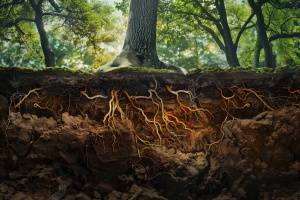If you remove the mushroom, nature falls apart
We often think of mushrooms as the visible fruit of a hidden world. A delicacy, a medicine, or simply a curiosity popping up after the rain. But beneath every mushroom lies an unseen network that is nothing less than the foundation of life on Earth. Remove the mushroom and nature, as we know it, begins to fall apart.
The hidden network beneath our feet
Every forest, meadow, and even your backyard soil hides a dense web of fungal threads called mycelium. This living network connects plants, trees, and microorganisms in an intricate underground communication system. It transports water, nutrients, and information, a kind of “wood wide web” that sustains entire ecosystems.
Without fungi, plants would struggle to grow. In fact, more than 90% of all plant species depend on a partnership with fungi known as mycorrhiza. These fungi attach to plant roots, exchanging minerals and moisture for sugars and carbon. It’s a perfect example of nature’s collaboration and without it, most forests would collapse.
The great recyclers
Fungi are the world’s ultimate recyclers. They decompose dead trees, fallen leaves, and animal remains, breaking down complex materials into nutrients that can be reused by other organisms. Without this process, forests would be buried under layers of organic waste, and the soil would become sterile.
In essence, fungi close the circle of life. When we remove them through soil degradation, chemical overuse, or deforestation, we break that natural recycling system. Nutrients stop flowing, and biodiversity declines.
An unsung climate ally
Fungi don’t just support plants — they also store massive amounts of carbon underground. Mycorrhizal fungi capture carbon from plant roots and lock it into the soil for decades or even centuries. Destroying fungal networks not only weakens plant life but also releases stored carbon back into the atmosphere, accelerating climate change.
The mushroom’s message
Mushrooms are the tip of a vast, intelligent system that has quietly sustained life for over a billion years. They are nature’s architects, caretakers and messengers, indicators of ecosystem health. When mushrooms disappear, it’s not just a culinary loss; it’s a warning sign that our environment is out of balance.
Protecting fungi means protecting life itself. Healthy soil, resilient forests, clean air, and even the food we eat all depend on the unseen world beneath our feet. So next time you see a mushroom in the wild, take a closer look. It’s not just a fungus, it’s a lifeline.
How do you see the role of fungi in the future of a healthier planet? We’d love to hear your thoughts, so drop us a line below!






















